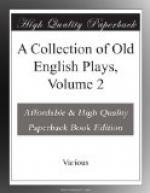Ga. How? my father wrongd yee? I’m his sonn.
Jou. Wert thou his father I’m wrongd,— Iniurd, calumniated, baffled to my teeth; And were it not that these gray haires of mine Were priviledgd ane enemy to vallour, I have a heart could see your fathers wrong—
Ga. What? raile you, sir?
Jac. Challenge a half pint pot.
Jou. There in
a sawpitt, knave, to quitt my self
Of such an inury.—Hee
writes mee here
That I should pay to you tenn
thousand crownes.
Ga. As being due to him.
Jou. But thatts not my quarrell, sir; for I did owe to him Millions of Crownes, millions of my love;— And but to send a note here for his owne! Ist not a quarrell for an honest man?
Jac. With very few, I thinke.
Jou. Why, looke yee, sir: When after many a storme and dreadfull blow Strooke from fire-belching clouds, bankrupt of life I have home return’d; when all my frends denide Their thresholds to mee, and my creditors Desir’d to sinke mee in a prisoners grave, Hee gave mee dying life, his helpefull hand Sent mee to sea and kept mee safe on land. Ist not a quarrell then to seeke butts owne?
Ga. Oh, pray, sir—
Jou. When all the talents of oppression Of usurers, lawyers and my creditors Had fangd upon my wife and family, Hee gave mee dying life, his helpfull hand Sent mee to sea and kept mee safe on land. Ist not a quarrell then to seeke but’s owne?
Ga. Good sir—
Jou. Come in,
sir, where I will pay all that you can demand:
Noe other quarrell, sir, shall
passe your hand.
Ga. If every [one]
should pay as well as you
The world were good, wee should
have bankrupts few.
Jac. I’m of your mind for that. [Exeunt.
We now come to a play (leaves 161-185), without title, and wanting some leaves at the end, on the subject of Richard the Second. I think with Mr. Halliwell-Phillipps, who printed eleven copies of this piece, that it is anterior to Shakespeare’s play. There is less extravagance of language than in most of the plays belonging to that early date (circ. 1593?); and the blank verse, though it is monotonous enough, has perhaps rather more variety than we should expect to find. Much of the play is taken up with Greene and Baggott; but the playwright has chiefly exerted himself in representing the murder of Woodstock at Calais. Before the murder, Woodstock falls asleep, and there appears to him the ghost of the Black Prince:




